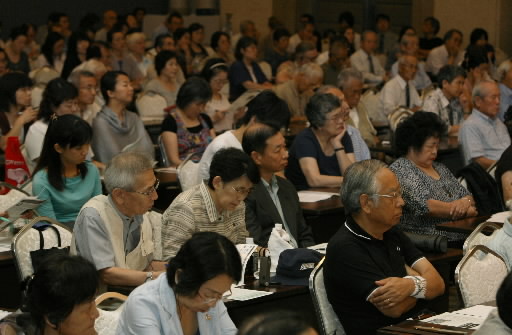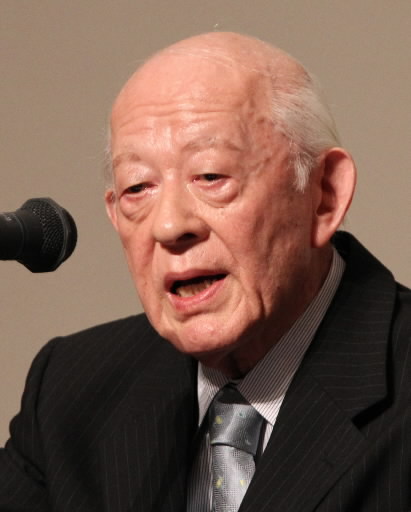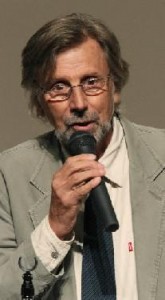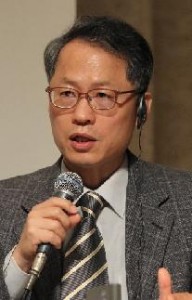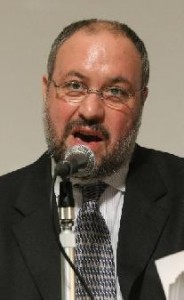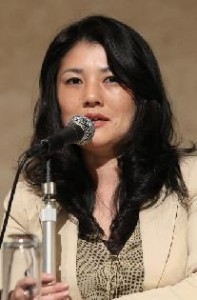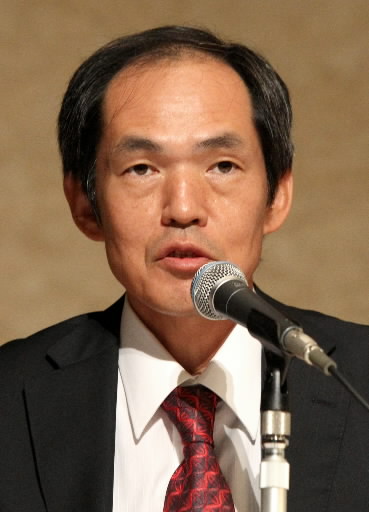International symposium: "What Should We Do to Advance Nuclear Abolition?"
Aug. 13, 2010
Leading up to the 65th anniversary of the dropping of the atomic bomb on Hiroshima, an international symposium was held at the International Conference Center Hiroshima in Peace Memorial Park on July 31 to discuss what measures can be taken to ensure that there are no more nuclear bombings. The title of the symposium was "What Should We Do to Advance Nuclear Abolition?: Reflections on the 2010 NPT Review Conference." Nearly 300 citizens attended the gathering, which was jointly sponsored by the Hiroshima Peace Institute of Hiroshima City University and the Hiroshima Peace Media Center, a wing of the Chugoku Shimbun. Experts from the United States, South Korea, and the A-bombed cities of Hiroshima and Nagasaki exchanged views on concrete steps toward nuclear abolition.
Panelists
Hideo Tsuchiyama, former president of Nagasaki University
Douglas Lummis, political scientist and critic
Sugok Shin, human resources development consultant
Sung Chull Kim, professor at the Hiroshima Peace Institute
Robert Jacobs, associate professor at the Hiroshima Peace Institute
Yumi Kanazaki, reporter for the Hiroshima Peace Media Center
Moderator
Kazumi Mizumoto, professor at the Hiroshima Peace Institute
Urgent need to adopt treaty banning nuclear weapons
The review conference for the Nuclear Non-proliferation Treaty in May was a disappointment. If you look at the final document, it is full of abstract language. It is a product of compromise.
In a speech he delivered in Prague last April, U.S. President Barack Obama said he would seek "a world without nuclear weapons." I appreciate the developments that have taken place since then, including the fact that language stating that the U.S. would not launch a nuclear attack on countries that have signed and abided by the NPT was included in the Nuclear Posture Review, which was published in April and which provides the guidelines for a new nuclear strategy. But I question whether the abolition of nuclear weapons can be achieved with Obama's conception alone.
How will strengthening the NPT framework affect non-signatory nations like India, Pakistan, and Israel? Ever since the NPT took effect, India has said that it cannot support the treaty because it includes clauses that are unfair or otherwise objectionable. Pakistan has said that it will not become a party to the treaty as long as India does not. Israel has not stated whether it possesses nuclear weapons or not.
Meanwhile Obama has said the U.S. will continue to provide a "nuclear umbrella" for its allies including Japan, South Korea, and Australia, while at the same time telling other nuclear nations that we should reduce the role of nuclear weapons. It's a paradox.
So, what shall we do? Pakistan is one country in which it is highly likely that nuclear weapons might fall into the hands of terrorists, so it is important that it is made part of an international framework, i.e. a nuclear weapons convention, as soon as possible. This sort of treaty is proposed at the United Nations General Assembly every year, and more than 100 countries have expressed support for it, including India, Pakistan, and Iran.
When it comes to considering what we should do, we must adopt a nuclear weapons convention as soon as possible. Japan must take the lead and eliminate opposition to such a treaty by other countries.
Twenty-one years after the end of the Cold War, the Japanese government is still stuck in a Cold War mentality. Japan still seeks the protection of the U.S. nuclear umbrella, citing threats to its security from North Korea, China, and other countries. Japan lacks the will to actively promote peace diplomacy among nations based on its peace constitution. The shortest path to the abolition of nuclear weapons is for the citizens of Hiroshima and Nagasaki to ensure that their voices are heard and that their power is felt by the Japanese government and by the nuclear-weapon states.
Hideo Tsuchiyama
Born in Nagasaki in 1925. Exposed to radiation after entering the city while a student at Nagasaki School of Medicine (now the faculty of medicine at Nagasaki University). Served as president of Nagasaki University from 1988 through 1992. Member of the Committee of Seven for World Peace Appeal.
Use of nuclear weapons is the same as a terrorist attack
With regard to today's topic of what we should do, I have no complaint with the people of Hiroshima, who have raised their voices in protest against nuclear weapons more than anyone else in the world. From the point of view of my field of the history of political thought, I believe it is important to use language correctly because when politicians use ambiguous language, it may be because they are trying to hide something.
For example, take the word terrorism. Following the terrorist attacks on September 11, 2001, the U.S. said it would launch a war on terror. I felt that the U.S. didn't really understand what terrorism was. In 2002 a friend and I placed an ad in a U.S. magazine asking for definitions of terrorism. We got about 50 replies, but no one could really answer the question.
In English and French the word terror means "an intense fear." According to the dictionary, it was first used in a political sense at the time of the Reign of Terror in France in the 18th century when governance by law was abandoned and the citizens were filled with fear. In the 19th century terrorism by anti-government forces arose. Even without killing on a massive scale, many people can be sent into a panic merely by targeting unspecified people.
Military strategy can also inspire fear and panic through a terrorism campaign that applies pressure to the other side and demoralizes them. The strange notion that random bombings are a humane way to bring about a more rapid end to war also arose. This results in terrorist bombing in which you don't know who is there but you conduct aerial bombing anyway merely because someone is there. When you think of it that way, the dropping of the atomic bombs was the ultimate form of terrorism.
But in the minds of many people the war on terror and the issue of nuclear weapons are separate. And the U.S., which possesses nuclear weapons, is carrying out a war on terror. Depending on how you look at it, if the U.S. wants to reduce terrorism it has to wage a war against its own army.
Nuclear deterrence also means a threat to retaliate or conduct terrorist attacks in the event of an invasion. The nuclear umbrella can be said to be a "terrorism umbrella." Before considering what must be done in order to eliminate nuclear weapons, it is important to discuss the situation we are in with a clear understanding of the political terminology being used.
Douglas Lummis
Born in San Francisco in 1936. Became a professor at Tsuda College in 1980. Has worked as a writer and lecturer in Okinawa since retiring in 2000. Author of Why Does America Go to War So Often? and other works.
Steps toward achieving abolition
Mizumoto: In your keynote speech you referred to a nuclear weapons convention. Who must be involved in the effort to make this a reality?
Tsuchiyama: We have the example of the treaty banning anti-personnel land mines and cluster bombs. The countries that supported the effort signed the treaty initially and then the number of participating countries was increased. Under this method countries that were opposed to the treaty were pressured to join. But in the case of nuclear weapons, whose possessor nations are limited, no matter how much effort the non-nuclear nations make, as long as the nuclear nations do nothing no progress will be made. That is where nuclear weapons differ fundamentally from anti-personnel land mines, and it is frustrating.
An international treaty requires ratification by legislatures. The key is how to win the support of the legislators of nuclear nations. It is also essential that Parliamentarians for Nuclear Non-proliferation and Disarmament applies pressure to the governments of nuclear nations by conveying the demands of non-governmental organizations. If they do that, I believe a nuclear weapons convention will become a reality.
Jacobs: There is a belief in the U.S. that nuclear weapons guarantee peace. They feel that as long as other nations and terrorists have nuclear weapons, nuclear abolition would be suicidal. Even since Obama became president, a tremendous amount of money has been freed up for the defense budget, and nuclear weapons are critical for the military economy. We can't expect politicians or other leaders in the U.S. to take the lead in the effort to abolish nuclear weapons. We have to create a situation in which citizens start a movement and then ensure that their voices are heeded by leaders.
Mizumoto: In the past, soldiers who witnessed nuclear tests in the U.S. and residents downwind of the test areas were also exposed to radiation.
Jacobs: Ties between the atomic bomb survivor groups in Hiroshima and the groups in the U.S. for those who were exposed to radiation are important. This means forming ties between hibakusha that transcend national borders. A global message must be heard by the United Nations and the governments of the world.
Kim: Pressure can also be applied to the nuclear nations through cooperation between non-nuclear nations. I think Japan has the capability to do that. But, at the same time, Japan is working to conclude a nuclear power pact with India, which has not signed the Nuclear Non-proliferation Treaty and is a de facto nuclear nation. For this and other reasons I feel there are limits to Japan's non-proliferation policy, and I sense a contradiction.
North Korea may follow India's lead and defend its possession of nuclear weapons. This logic runs counter to the denuclearization of the Korean peninsula and the hopes of Hiroshima and Nagasaki. Japan wants to continue its reprocessing of spent nuclear fuel, but the stockpiling of large amounts of plutonium may pose a threat to the peaceful use of nuclear energy.
Kanazaki: The Japanese government has taken the position that it is too soon for a nuclear weapons convention. Although Japan suffered atomic bombings, the government dare not say that nuclear weapons are illegal. The majority of countries believe that rather than preserving a nation's security, nuclear weapons pose a risk. While reporting on the NPT review conference in May, I felt once again that Japan, which relies on the nuclear weapons of the U.S. and asserts that the nuclear umbrella is necessary, is out of the mainstream.
Tsuchiyama: How can Japan and South Korea get out from under the U.S. nuclear umbrella? I think it is important for Japan, South Korea, and North Korea to create a nuclear weapon-free zone in Northeast Asia and to enter into a treaty with the U.S., Russia, and China under which they agree not to launch a nuclear attack. But this effort is lagging at the government level, and the NGOs and others who are promoting a dialogue on this must push the government to move forward.
Message of Hiroshima and Nagasaki
Mizumoto: Is the message of Hiroshima and Nagasaki reaching the people of the world?
Shin: It seems to me Hiroshima is a city that is at a loss for words. Although they have many emotions and feelings, the citizens have not raised their voices and no longer can. And neither the government nor society tried to listen. That is the pain of Hiroshima.
Tsuchiyama: For the most part, peace movements in the past were led by organizations such as political parties and labor unions. They are powerful, but when people with the same vision, including those overseas, get together they suffer from the illusion that their voices have been heard. Spreading the movement at the grassroots level by individual citizens is more effective I think.
Jacobs: Not so many people routinely sense the threat that nuclear weapons pose, because people tend to regard the "never again" message of Hiroshima and Nagasaki more as something to do with a tragedy that occurred in the past rather than as an expression of concern for the future. Even now there are wars going on around the world, so I would like the people of Hiroshima and Nagasaki to speak out not only against nuclear weapons but also against conventional weapons and war itself.
Kim: Atomic bomb survivors of Hiroshima and Nagasaki and Asians who were victims of violence by Japan during its militaristic era can sympathize with each other in some respects. If Hiroshima and Nagasaki listen to the voices of the people of Asia, strategies for the elimination of nuclear weapons will spread.
Lummis: The message of Okinawa does not seem to be heard either. Nationwide as much as 75 percent of the population supports the Japan-U.S. Security Treaty, but in Okinawa, where most of the U.S. bases are located, the support is only 6 percent. People say they object to war and they want the U.S. to protect them, yet they don't want any bases. It's a contradictory notion. I would like people to give the security treaty more thought as well.
Kanazaki: When I interviewed experts and others in the U.S., some of them agreed that it was important for the voices of Hiroshima and Nagasaki to be heard there but also said that first the voices needed to be heard by the government of Japan. Some noted that while the Japanese government asks the U.S. to protect it with its nuclear weapons, the atomic bomb survivors are opposed to that and pointed out the inconsistency. What is most important is the call by the citizens of the world to abolish nuclear weapons. At the same time, I would like people to be more aware of the need to join hands with individuals and groups overseas.
Mizumoto: How should Japan regard its responsibility for its aggression during the war while at the same time calling for the abolition of nuclear weapons? This question has also been received from the audience.
Shin: It seems to me that rather than thinking it does not want to go to war again the Japanese government did not want to lose a war again. Japan refers to itself as the only country that has suffered atomic bombings, but what stance has it taken towards the atomic bomb survivors? In light of the war Japan launched from the platform of the Korean peninsula, it can be said that, as an aggressor, Japan was not able to be a proper victim.
There are people who apologize for Japan's past aggression, but they did not actually kill anyone. I don't think there is a need to apologize for the behavior of others. What is important is to take action to prevent a recurrence, because if people do nothing about harm being done right before their eyes, they become perpetrators of that harm. If you consider how much bloodshed was caused by Poland and France and the effort they expended to share a common history with Germany, then partial responsibility for causing Japan to run amok lies with Korea.
The power of citizens
Mizumoto: Exactly what sort of action should we take at the citizen level?
Kim: I was very surprised once when I asked a Japanese young person who Japan's enemy was and the reply was "China." The U.S. Defense Secretary once said, "If we look at China as our enemy, they will become our enemy." I would like people to think about what that means.
Jacobs: People thought that colonial rule and totalitarianism would never end. But the small efforts of many individuals gained momentum and colonial rule and totalitarianism ultimately collapsed. Nuclear weapons also will be eliminated someday. People mustn't think that the problem is so great that there is nothing that they as individuals can do. They must keep on fighting.
Shin: I think it's important to waste no time in joining hands with people with whom we can share an understanding even if only slightly. But because we are always divided, we have very little power. I make it a point to send a fax to the station when I hear something strange said on television and to call the newspaper company when I read a good article. Things will change through our support of people who are making an effort. Personally, I think it is important to keep expressing my opinion. I would like to examine the responsibilities of both the country that dropped the atomic bomb and the country that caused it to be dropped.
Lummis: I would like them to struggle with this together. Mahatma Gandhi of India said the British were able to continue to rule his country because Indian citizens offered their cooperation. He said that if India stopped cooperating with the British, Britain's authority would evaporate and India would achieve true independence. If people have their own ideas, apart from those of the government, and these ideas spread throughout the society, I think they can make a big difference.
Tsuchiyama: When you look at public opinion surveys taken in Japan, they show that 75 percent of the people sense a contradiction in Japan's desire to be shielded by the nuclear umbrella while at the same time calling for the abolition of nuclear weapons. And the same percentage says that the security partnership of Japan and the U.S., with its nuclear weapons, contributes to peace and security. So, there is a big inconsistency in Japan as well. I would like people to recognize that those in other regions of Japan don't take the nuclear issue as seriously as the people of Hiroshima and Nagasaki do. It is important to convey your message to people overseas, but we must first consider to what extent we have won over others right here in Japan.
Profiles of Panelists
Sugok Shin
Born in Tokyo in 1959. Consultant in organizational management and human resources development to businesses, local governments and educational institutions. Member of the Kanagawa Human Rights Policy Promotion Forum.
Sung Chull Kim
Born in Kwangju, South Korea, in 1956. Assumed his current post in 2007 after serving as a senior researcher at the Korea Institute for National Reunification and in other positions. Specializes in issues related to the Korean peninsula and regionalism in Northeast Asia.
Robert Jacobs
Born in Chicago in 1960. After obtaining his doctorate from the University of Illinois became an instructor at the Hiroshima Peace Institute. Assumed his current post this year. Specializes in history.
Yumi Kanazaki
Born in Akita Prefecture in 1970. Employed by the Chugoku Shimbun since 1995. Served in the international news division, the Tokyo bureau and other departments before starting on the series of articles "Nuclear Weapons Can Be Eliminated" in November 2008.
Kazumi Mizumoto
Born in Hiroshima in 1957. Assumed his current post this year after working as a newspaper reporter and serving as an associate professor at the Hiroshima Peace Institute. Specializes in international politics and nuclear disarmament. Author of Kaku wa haizetsu dekiru ka (Can Nuclear Weapons Be Abolished?).
The Conference expresses its deep concern at the catastrophic humanitarian consequences of any use of nuclear weapons.
All states need to make special efforts to establish the necessary framework to achieve and maintain a world without nuclear weapons.
The Conference notes the Five-Point Proposal for Nuclear Disarmament of the Secretary-General of the United Nations, which proposes inter alia consideration of negotiations on a nuclear weapons convention.
The Russian Federation and the United States of America commit to seek the early entry-into-force and full implementation of the Treaty on Measures for the Further Reduction and Limitation of Strategic Offensive Arms.
The nuclear-weapon States are called upon to report the above undertakings to the Preparatory Committee at 2014.
The Conference on Disarmament in Geneva should immediately establish a subsidiary body to deal with nuclear disarmament.
All nuclear weapon states should fully respect the decision on negative security assurance.
The Comprehensive Test Ban Treaty (CTBT) should be ratified.
The creation of further nuclear-weapon-free zones should be promoted.
The Conference on Disarmament in Geneva should immediately begin negotiation of a treaty banning the production of fissile material
Further facilitate and assist the States parties in the conclusion and entry into force of comprehensive (safeguards agreements) and additional protocols involving the International Atomic Energy Agency (IAEA).
All States of the Middle East should join the NPT as non-nuclear states. Convene a Conference in 2012, to be attended by all States of the Middle East, on the establishment of a Middle East zone free of nuclear weapons and all other weapons of mass destruction.
The Democratic People's Republic of Korea to fulfill the commitments under the Six-Party Talks, including the complete and verifiable abandonment of all nuclear weapons…and urge the Democratic People's Republic of Korea to return, at an early date, to the Treaty.
Panelists
Hideo Tsuchiyama, former president of Nagasaki University
Douglas Lummis, political scientist and critic
Sugok Shin, human resources development consultant
Sung Chull Kim, professor at the Hiroshima Peace Institute
Robert Jacobs, associate professor at the Hiroshima Peace Institute
Yumi Kanazaki, reporter for the Hiroshima Peace Media Center
Moderator
Kazumi Mizumoto, professor at the Hiroshima Peace Institute
Summary of keynote speech by Hideo Tsuchiyama
Urgent need to adopt treaty banning nuclear weapons
The review conference for the Nuclear Non-proliferation Treaty in May was a disappointment. If you look at the final document, it is full of abstract language. It is a product of compromise.
In a speech he delivered in Prague last April, U.S. President Barack Obama said he would seek "a world without nuclear weapons." I appreciate the developments that have taken place since then, including the fact that language stating that the U.S. would not launch a nuclear attack on countries that have signed and abided by the NPT was included in the Nuclear Posture Review, which was published in April and which provides the guidelines for a new nuclear strategy. But I question whether the abolition of nuclear weapons can be achieved with Obama's conception alone.
How will strengthening the NPT framework affect non-signatory nations like India, Pakistan, and Israel? Ever since the NPT took effect, India has said that it cannot support the treaty because it includes clauses that are unfair or otherwise objectionable. Pakistan has said that it will not become a party to the treaty as long as India does not. Israel has not stated whether it possesses nuclear weapons or not.
Meanwhile Obama has said the U.S. will continue to provide a "nuclear umbrella" for its allies including Japan, South Korea, and Australia, while at the same time telling other nuclear nations that we should reduce the role of nuclear weapons. It's a paradox.
So, what shall we do? Pakistan is one country in which it is highly likely that nuclear weapons might fall into the hands of terrorists, so it is important that it is made part of an international framework, i.e. a nuclear weapons convention, as soon as possible. This sort of treaty is proposed at the United Nations General Assembly every year, and more than 100 countries have expressed support for it, including India, Pakistan, and Iran.
When it comes to considering what we should do, we must adopt a nuclear weapons convention as soon as possible. Japan must take the lead and eliminate opposition to such a treaty by other countries.
Twenty-one years after the end of the Cold War, the Japanese government is still stuck in a Cold War mentality. Japan still seeks the protection of the U.S. nuclear umbrella, citing threats to its security from North Korea, China, and other countries. Japan lacks the will to actively promote peace diplomacy among nations based on its peace constitution. The shortest path to the abolition of nuclear weapons is for the citizens of Hiroshima and Nagasaki to ensure that their voices are heard and that their power is felt by the Japanese government and by the nuclear-weapon states.
Hideo Tsuchiyama
Born in Nagasaki in 1925. Exposed to radiation after entering the city while a student at Nagasaki School of Medicine (now the faculty of medicine at Nagasaki University). Served as president of Nagasaki University from 1988 through 1992. Member of the Committee of Seven for World Peace Appeal.
Summary of keynote speech by Douglas Lummis
Use of nuclear weapons is the same as a terrorist attack
With regard to today's topic of what we should do, I have no complaint with the people of Hiroshima, who have raised their voices in protest against nuclear weapons more than anyone else in the world. From the point of view of my field of the history of political thought, I believe it is important to use language correctly because when politicians use ambiguous language, it may be because they are trying to hide something.
For example, take the word terrorism. Following the terrorist attacks on September 11, 2001, the U.S. said it would launch a war on terror. I felt that the U.S. didn't really understand what terrorism was. In 2002 a friend and I placed an ad in a U.S. magazine asking for definitions of terrorism. We got about 50 replies, but no one could really answer the question.
In English and French the word terror means "an intense fear." According to the dictionary, it was first used in a political sense at the time of the Reign of Terror in France in the 18th century when governance by law was abandoned and the citizens were filled with fear. In the 19th century terrorism by anti-government forces arose. Even without killing on a massive scale, many people can be sent into a panic merely by targeting unspecified people.
Military strategy can also inspire fear and panic through a terrorism campaign that applies pressure to the other side and demoralizes them. The strange notion that random bombings are a humane way to bring about a more rapid end to war also arose. This results in terrorist bombing in which you don't know who is there but you conduct aerial bombing anyway merely because someone is there. When you think of it that way, the dropping of the atomic bombs was the ultimate form of terrorism.
But in the minds of many people the war on terror and the issue of nuclear weapons are separate. And the U.S., which possesses nuclear weapons, is carrying out a war on terror. Depending on how you look at it, if the U.S. wants to reduce terrorism it has to wage a war against its own army.
Nuclear deterrence also means a threat to retaliate or conduct terrorist attacks in the event of an invasion. The nuclear umbrella can be said to be a "terrorism umbrella." Before considering what must be done in order to eliminate nuclear weapons, it is important to discuss the situation we are in with a clear understanding of the political terminology being used.
Douglas Lummis
Born in San Francisco in 1936. Became a professor at Tsuda College in 1980. Has worked as a writer and lecturer in Okinawa since retiring in 2000. Author of Why Does America Go to War So Often? and other works.
Panel Discussion
Steps toward achieving abolition
Mizumoto: In your keynote speech you referred to a nuclear weapons convention. Who must be involved in the effort to make this a reality?
Tsuchiyama: We have the example of the treaty banning anti-personnel land mines and cluster bombs. The countries that supported the effort signed the treaty initially and then the number of participating countries was increased. Under this method countries that were opposed to the treaty were pressured to join. But in the case of nuclear weapons, whose possessor nations are limited, no matter how much effort the non-nuclear nations make, as long as the nuclear nations do nothing no progress will be made. That is where nuclear weapons differ fundamentally from anti-personnel land mines, and it is frustrating.
An international treaty requires ratification by legislatures. The key is how to win the support of the legislators of nuclear nations. It is also essential that Parliamentarians for Nuclear Non-proliferation and Disarmament applies pressure to the governments of nuclear nations by conveying the demands of non-governmental organizations. If they do that, I believe a nuclear weapons convention will become a reality.
Jacobs: There is a belief in the U.S. that nuclear weapons guarantee peace. They feel that as long as other nations and terrorists have nuclear weapons, nuclear abolition would be suicidal. Even since Obama became president, a tremendous amount of money has been freed up for the defense budget, and nuclear weapons are critical for the military economy. We can't expect politicians or other leaders in the U.S. to take the lead in the effort to abolish nuclear weapons. We have to create a situation in which citizens start a movement and then ensure that their voices are heeded by leaders.
Mizumoto: In the past, soldiers who witnessed nuclear tests in the U.S. and residents downwind of the test areas were also exposed to radiation.
Jacobs: Ties between the atomic bomb survivor groups in Hiroshima and the groups in the U.S. for those who were exposed to radiation are important. This means forming ties between hibakusha that transcend national borders. A global message must be heard by the United Nations and the governments of the world.
Kim: Pressure can also be applied to the nuclear nations through cooperation between non-nuclear nations. I think Japan has the capability to do that. But, at the same time, Japan is working to conclude a nuclear power pact with India, which has not signed the Nuclear Non-proliferation Treaty and is a de facto nuclear nation. For this and other reasons I feel there are limits to Japan's non-proliferation policy, and I sense a contradiction.
North Korea may follow India's lead and defend its possession of nuclear weapons. This logic runs counter to the denuclearization of the Korean peninsula and the hopes of Hiroshima and Nagasaki. Japan wants to continue its reprocessing of spent nuclear fuel, but the stockpiling of large amounts of plutonium may pose a threat to the peaceful use of nuclear energy.
Kanazaki: The Japanese government has taken the position that it is too soon for a nuclear weapons convention. Although Japan suffered atomic bombings, the government dare not say that nuclear weapons are illegal. The majority of countries believe that rather than preserving a nation's security, nuclear weapons pose a risk. While reporting on the NPT review conference in May, I felt once again that Japan, which relies on the nuclear weapons of the U.S. and asserts that the nuclear umbrella is necessary, is out of the mainstream.
Tsuchiyama: How can Japan and South Korea get out from under the U.S. nuclear umbrella? I think it is important for Japan, South Korea, and North Korea to create a nuclear weapon-free zone in Northeast Asia and to enter into a treaty with the U.S., Russia, and China under which they agree not to launch a nuclear attack. But this effort is lagging at the government level, and the NGOs and others who are promoting a dialogue on this must push the government to move forward.
Message of Hiroshima and Nagasaki
Mizumoto: Is the message of Hiroshima and Nagasaki reaching the people of the world?
Shin: It seems to me Hiroshima is a city that is at a loss for words. Although they have many emotions and feelings, the citizens have not raised their voices and no longer can. And neither the government nor society tried to listen. That is the pain of Hiroshima.
Tsuchiyama: For the most part, peace movements in the past were led by organizations such as political parties and labor unions. They are powerful, but when people with the same vision, including those overseas, get together they suffer from the illusion that their voices have been heard. Spreading the movement at the grassroots level by individual citizens is more effective I think.
Jacobs: Not so many people routinely sense the threat that nuclear weapons pose, because people tend to regard the "never again" message of Hiroshima and Nagasaki more as something to do with a tragedy that occurred in the past rather than as an expression of concern for the future. Even now there are wars going on around the world, so I would like the people of Hiroshima and Nagasaki to speak out not only against nuclear weapons but also against conventional weapons and war itself.
Kim: Atomic bomb survivors of Hiroshima and Nagasaki and Asians who were victims of violence by Japan during its militaristic era can sympathize with each other in some respects. If Hiroshima and Nagasaki listen to the voices of the people of Asia, strategies for the elimination of nuclear weapons will spread.
Lummis: The message of Okinawa does not seem to be heard either. Nationwide as much as 75 percent of the population supports the Japan-U.S. Security Treaty, but in Okinawa, where most of the U.S. bases are located, the support is only 6 percent. People say they object to war and they want the U.S. to protect them, yet they don't want any bases. It's a contradictory notion. I would like people to give the security treaty more thought as well.
Kanazaki: When I interviewed experts and others in the U.S., some of them agreed that it was important for the voices of Hiroshima and Nagasaki to be heard there but also said that first the voices needed to be heard by the government of Japan. Some noted that while the Japanese government asks the U.S. to protect it with its nuclear weapons, the atomic bomb survivors are opposed to that and pointed out the inconsistency. What is most important is the call by the citizens of the world to abolish nuclear weapons. At the same time, I would like people to be more aware of the need to join hands with individuals and groups overseas.
Mizumoto: How should Japan regard its responsibility for its aggression during the war while at the same time calling for the abolition of nuclear weapons? This question has also been received from the audience.
Shin: It seems to me that rather than thinking it does not want to go to war again the Japanese government did not want to lose a war again. Japan refers to itself as the only country that has suffered atomic bombings, but what stance has it taken towards the atomic bomb survivors? In light of the war Japan launched from the platform of the Korean peninsula, it can be said that, as an aggressor, Japan was not able to be a proper victim.
There are people who apologize for Japan's past aggression, but they did not actually kill anyone. I don't think there is a need to apologize for the behavior of others. What is important is to take action to prevent a recurrence, because if people do nothing about harm being done right before their eyes, they become perpetrators of that harm. If you consider how much bloodshed was caused by Poland and France and the effort they expended to share a common history with Germany, then partial responsibility for causing Japan to run amok lies with Korea.
The power of citizens
Mizumoto: Exactly what sort of action should we take at the citizen level?
Kim: I was very surprised once when I asked a Japanese young person who Japan's enemy was and the reply was "China." The U.S. Defense Secretary once said, "If we look at China as our enemy, they will become our enemy." I would like people to think about what that means.
Jacobs: People thought that colonial rule and totalitarianism would never end. But the small efforts of many individuals gained momentum and colonial rule and totalitarianism ultimately collapsed. Nuclear weapons also will be eliminated someday. People mustn't think that the problem is so great that there is nothing that they as individuals can do. They must keep on fighting.
Shin: I think it's important to waste no time in joining hands with people with whom we can share an understanding even if only slightly. But because we are always divided, we have very little power. I make it a point to send a fax to the station when I hear something strange said on television and to call the newspaper company when I read a good article. Things will change through our support of people who are making an effort. Personally, I think it is important to keep expressing my opinion. I would like to examine the responsibilities of both the country that dropped the atomic bomb and the country that caused it to be dropped.
Lummis: I would like them to struggle with this together. Mahatma Gandhi of India said the British were able to continue to rule his country because Indian citizens offered their cooperation. He said that if India stopped cooperating with the British, Britain's authority would evaporate and India would achieve true independence. If people have their own ideas, apart from those of the government, and these ideas spread throughout the society, I think they can make a big difference.
Tsuchiyama: When you look at public opinion surveys taken in Japan, they show that 75 percent of the people sense a contradiction in Japan's desire to be shielded by the nuclear umbrella while at the same time calling for the abolition of nuclear weapons. And the same percentage says that the security partnership of Japan and the U.S., with its nuclear weapons, contributes to peace and security. So, there is a big inconsistency in Japan as well. I would like people to recognize that those in other regions of Japan don't take the nuclear issue as seriously as the people of Hiroshima and Nagasaki do. It is important to convey your message to people overseas, but we must first consider to what extent we have won over others right here in Japan.
Profiles of Panelists
Sugok Shin
Born in Tokyo in 1959. Consultant in organizational management and human resources development to businesses, local governments and educational institutions. Member of the Kanagawa Human Rights Policy Promotion Forum.
Sung Chull Kim
Born in Kwangju, South Korea, in 1956. Assumed his current post in 2007 after serving as a senior researcher at the Korea Institute for National Reunification and in other positions. Specializes in issues related to the Korean peninsula and regionalism in Northeast Asia.
Robert Jacobs
Born in Chicago in 1960. After obtaining his doctorate from the University of Illinois became an instructor at the Hiroshima Peace Institute. Assumed his current post this year. Specializes in history.
Yumi Kanazaki
Born in Akita Prefecture in 1970. Employed by the Chugoku Shimbun since 1995. Served in the international news division, the Tokyo bureau and other departments before starting on the series of articles "Nuclear Weapons Can Be Eliminated" in November 2008.
Kazumi Mizumoto
Born in Hiroshima in 1957. Assumed his current post this year after working as a newspaper reporter and serving as an associate professor at the Hiroshima Peace Institute. Specializes in international politics and nuclear disarmament. Author of Kaku wa haizetsu dekiru ka (Can Nuclear Weapons Be Abolished?).
Outline of the final document adopted at the 2010 NPT Review Conference
The Conference expresses its deep concern at the catastrophic humanitarian consequences of any use of nuclear weapons.
All states need to make special efforts to establish the necessary framework to achieve and maintain a world without nuclear weapons.
The Conference notes the Five-Point Proposal for Nuclear Disarmament of the Secretary-General of the United Nations, which proposes inter alia consideration of negotiations on a nuclear weapons convention.
The Russian Federation and the United States of America commit to seek the early entry-into-force and full implementation of the Treaty on Measures for the Further Reduction and Limitation of Strategic Offensive Arms.
The nuclear-weapon States are called upon to report the above undertakings to the Preparatory Committee at 2014.
The Conference on Disarmament in Geneva should immediately establish a subsidiary body to deal with nuclear disarmament.
All nuclear weapon states should fully respect the decision on negative security assurance.
The Comprehensive Test Ban Treaty (CTBT) should be ratified.
The creation of further nuclear-weapon-free zones should be promoted.
The Conference on Disarmament in Geneva should immediately begin negotiation of a treaty banning the production of fissile material
Further facilitate and assist the States parties in the conclusion and entry into force of comprehensive (safeguards agreements) and additional protocols involving the International Atomic Energy Agency (IAEA).
All States of the Middle East should join the NPT as non-nuclear states. Convene a Conference in 2012, to be attended by all States of the Middle East, on the establishment of a Middle East zone free of nuclear weapons and all other weapons of mass destruction.
The Democratic People's Republic of Korea to fulfill the commitments under the Six-Party Talks, including the complete and verifiable abandonment of all nuclear weapons…and urge the Democratic People's Republic of Korea to return, at an early date, to the Treaty.
(Originally published on August 4, 2010)

